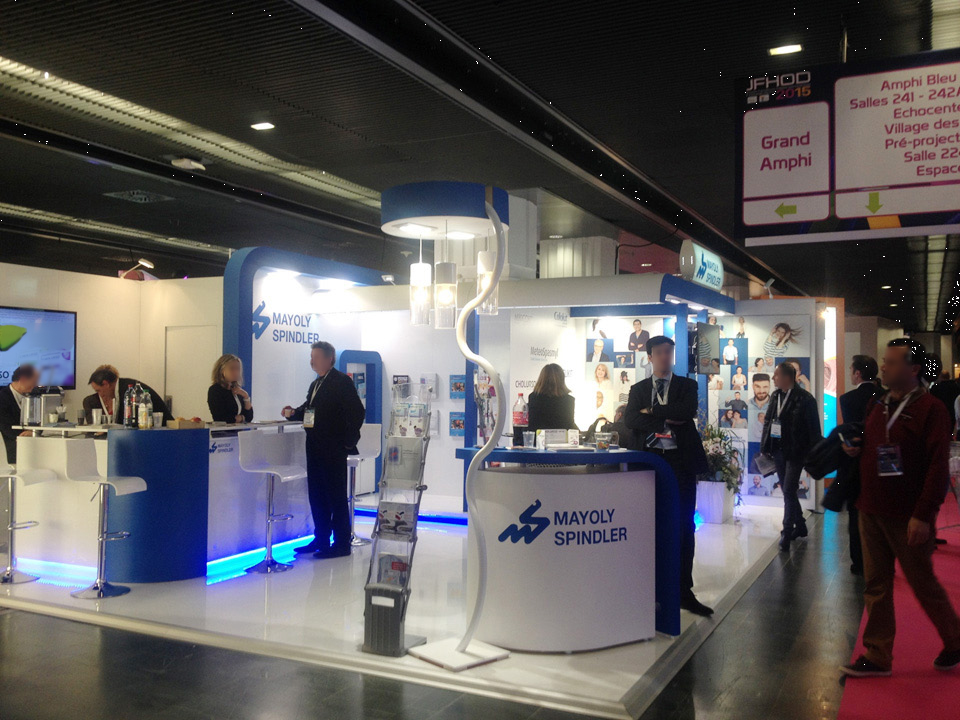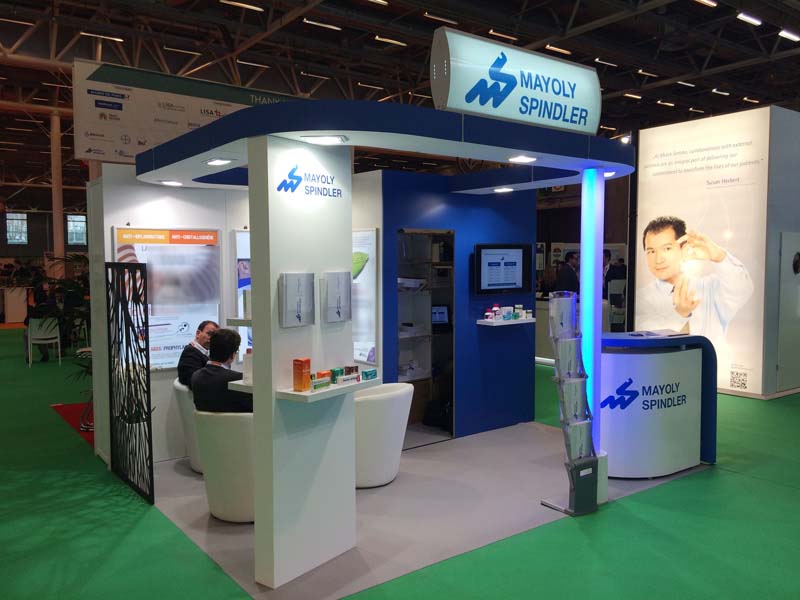JFHOD
Les Laboratoires MAYOLY SPINDLER sont les partenaires des Journées Francophones d’Hépato-Gastroenterologie et d’Oncologie Digestive 2015. Rendez-vous sur notre stand et lors de nos 2 ateliers déjeuners : « Optimiser la coloscopie en 2015 : chez qui, comment, sur quels critères et jusqu’où ? » et « Maladies cholestatiques et acide ursodésosycholique : de l’actualité à la pratique. ».
Pour plus de détails : www.jfhod.com/.
JFHOD
Les Journées Francophones d’Hépato-gastroentérologie et d’Oncologie Digestive (JFHOD) se sont déroulées du 19 au 22 mars au Palais des congrès de Paris.
Les JFHOD 2015 ont connu une affluence exceptionnelle avec plus de 3 770 participants et 55 partenaires industriels et institutionnels.
Le pays mis à l’honneur était l’Algérie et la thématique la génétique.
Toutes nos équipes franco-algériennes ce sont relayées sur notre stand afin de recevoir les gastroentérologues.
Nos 2 ateliers-déjeuner, ont fait salle comble et rencontré un franc succès. Près de 700 médecins y ont assisté.
Un article sera publié dans la newsletter Gastroentérologie que les Laboratoires Mayoly Spindler parraine et dans la revue Hépato-Gastro & Oncologie Digestive.
Notre symposium franco-algérien a quant à lui réuni 54 gastroentérologues algériens autour du thème : Infection à Helicobacter pylori : « similitudes et spécificités en France et en Algérie ».
Les JFHOD, est donc LE congrès de l’année en gastroentérologie pour Mayoly Spindler qui a su marquer de son empreinte l’édition 2015 et s’imposer comme un partenaire incontournable des gastroentérologues.
BIO-EUROPE SPRING
Le salon BIO-Europe Spring 2015 s’est tenu du 9 au 11 mars à Paris, réunissant 2 400 participants avec 1 400 sociétés représentées.
Ce salon s’affiche comme une véritable référence européenne en matière de licences et autres partenariats industriels et commerciaux dans le secteur de la Santé.
Pour sa première édition en France, BIO-Europe a été une vraie réussite pour notre laboratoire.
Notre présence sur ce salon a été l’occasion pour l’équipe Business Development d’envisager :
– le développement de nos opérations au niveau européen
– l’acquisition de nouveaux produits en gastroentérologie pour l’ensemble de nos territoires.
En tant que partenaire privilégié, nous avons pu présenter notre laboratoire à l’ensemble des participants.
BIO-Europe pour Mayoly Spindler, c’est de nouveaux projets envisagés dans 17 langues différentes.
Source : Hervé Hagège, MD – CHI de Créteil Service d’Hépato-Gastroentérologie Créteil France
Background and study aims :
The purpose of this study was to describe the real-life conditions of use, efficacy, safety, and acceptability of sodium phosphate (NaP) tablets for colon cleansing in routine medical practice in France.
Source: Department of Gastroenterology, UMR 1073, Rouen University Hospital, University of Rouen, Rouen, France.
BACKGROUND:
In routine practice, irritable bowel syndrome (IBS) symptoms are often difficult to be relieved and impair significantly patients’ quality of life (QoL). A randomised, double-blind, placebo-controlled study has shown the efficacy of alverine citrate/simeticone (ACS) combination for IBS symptom relief.
AIM:
As IBS symptoms are often intermittent, this pragmatic study was designed to compare the efficacy of an on-demand ACS treatment vs. that of usual treatments.
METHODS:
Rome III IBS patients were enrolled by 87 general practitioners who were randomly allocated to one of two therapeutic strategies: on-demand ACS or usual treatment chosen by the physician. The primary outcome measure was the improvement of the IBSQoL score between inclusion and month 6.
RESULTS:
A total of 436 patients (mean age: 54.4 years; women: 73.4%) were included, 222 in the ACS arm and 214 patients in the usual treatment arm, which was mainly antispasmodics. At 6 months, improvement of IBSQoL was greater with ACS than with the usual treatment group (13.8 vs. 8.4; p < 0.0008). The IBS-severity symptom score (IBS-SSS) was lower with ACS than in the usual treatment arm with a mean (SE) decrease of 170.0 (6.6) vs. 110.7 (6.7), respectively (p = 0.0001). An IBS-SSS < 75 was more frequent in the ACS group (37.7% vs. 16.0%; p < 0.0001). Improvement of both abdominal pain and bloating severity was also greater with the on-demand ACS treatment, which was associated with both lower direct and indirect costs.
CONCLUSIONS:
After 6 months, on-demand ACS treatment led to a greater improvement of QoL, reduced the burden of the disease and was more effective for IBS symptom relief than usual treatments.
© 2013 The Authors International Journal of Clinical Practice Published by John Wiley & Sons Ltd.
Source: Department of Neurogastroenterology, Toxalim- INRA, Toulouse, France. %6C%62%75%65%6E%6F%40%74%6F%75%6C%6F%75%73%65%2E%69%6E%72%61%2E%66%72
OBJECTIVES:
Alverine, an antispasmodic agent for the treatment of irritable bowel syndrome (IBS), may be combined with simethicone, a protective agent of the mucosa. Stress is a major factor triggering abdominal pain in IBS and causing hypersensitivity to colonic distension in animals through an increased colonic permeability. The antinociceptive effects of alverine and simethicone, separately or in association, were evaluated on stress-induced colonic hypersensitivity to distension in rats. The influence of simethicone on altered permeability was also tested.
METHODS:
Groups of 8-10 female adult Wistar rats (200-250 g) housed individually were used. Gut paracellular permeability was evaluated after 2 h of partial restraint stress using oral gavage with (51) Cr-EDTA and 24 h of urine collection. The number of abdominal cramps during colonic distension was evaluated in animals equipped with electrodes on their abdominal striated muscles.
KEY FINDINGS:
At 200 mg/kg p.o. twice a day, but not at lower doses, simethicone reduced stress-induced increase of colonic permeability and hypersensitivity to distension. Administered alone at 10 mg/kg p.o., alverine also reduced stress-induced hypersensitivity to distension; lower doses were inactive. However, alverine administered at an inactive dose with simethicone suppressed stress-induced hypersensitivity to distension.
CONCLUSIONS:
We conclude that both simethicone and alverine have visceral antinociceptive effects by two different mechanisms and that simethicone exerts a potentiating effect on the antinociceptive action of alverine.
Source : Guillaume Cadiot, Service d’hépato-gastroentérologie et de cancérologie digestive, Hôpital Robert Debre´, Rue Serge Kochman, 51092 Reims cedex, France.
Background :
The factors associated with inadequate bowel cleansing leading to colonoscopy failure are not well known.
Source: 1First Department of Medicine, University of Szeged, Szeged, Hungary. witt@in1st.szote.u-szeged.hu
Abstract
BACKGROUND:
Alverine citrate and simeticone combination has been used for almost 20 years in irritable bowel syndrome (IBS), but supportive scientific evidence of efficacy was limited.
AIM:
To evaluate the efficacy of alverine citrate and simeticone combination in patients with IBS-related abdominal pain/discomfort.
METHODS:
A total of 412 IBS patients meeting ROME III criteria were included in this double-blind randomized placebo-controlled study if their abdominal pain/discomfort intensity was at least 60 mm on a 0-100 mm visual analogue scale (VAS) during a 2-week run-in treatment-free period. Patients were randomly assigned through the use of Interactive Voice Response System to receive either alverine citrate 60 mg with simeticone 300 mg three times daily or matching placebo for 4 weeks.
RESULTS:
The full analysis set included 409 patients (71.4% female: mean age: 46.2 +/- 13.9 years). At week 4, alverine citrate and simeticone group had lower VAS scores of abdominal pain/discomfort (median: 40 mm vs. 50 mm, P = 0.047) and higher responder rate (46.8% vs. 34.3%, OR = 1.3; P = 0.01) as compared with placebo group. Patient receiving alverine citrate and simeticone reported greater global symptom improvement compared with those receiving placebo (P = 0.0001). Reported adverse events were similar in both groups.
CONCLUSION:
Alverine citrate/simeticone combination was significantly more effective than placebo in relieving abdominal pain/discomfort in patients with IBS.




